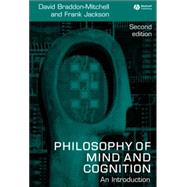
What is included with this book?
Frank Jackson is Distinguished Professor of Philosophy and Director of the Research School of Social Sciences at the Australian National University. He is the author of Conditionals (Blackwell, 1987) and his John Locke Lectures were published as From Metaphysics to Ethics in 1998.
| Preface | x | ||||
| Part I: From Dualism to Common-sense Functionalism | 1 | (64) | |||
|
3 | (34) | |||
|
3 | (18) | |||
|
4 | (6) | |||
|
10 | (2) | |||
|
12 | (3) | |||
|
15 | (4) | |||
|
19 | (2) | |||
|
21 | (2) | |||
|
21 | (2) | |||
|
23 | (1) | |||
|
23 | (12) | |||
|
24 | (4) | |||
|
28 | (1) | |||
|
28 | (2) | |||
|
30 | (1) | |||
|
31 | (4) | |||
|
35 | (2) | |||
|
37 | (11) | |||
|
38 | (2) | |||
|
40 | (1) | |||
|
41 | (4) | |||
|
45 | (1) | |||
|
46 | (1) | |||
|
47 | (1) | |||
|
48 | (17) | |||
|
49 | (3) | |||
|
52 | (3) | |||
|
55 | (4) | |||
|
59 | (2) | |||
|
61 | (3) | |||
|
64 | (1) | |||
| Part II: Rivals and Objections | 65 | (104) | |||
|
67 | (17) | |||
|
67 | (5) | |||
|
69 | (3) | |||
|
72 | (7) | |||
|
75 | (4) | |||
|
79 | (4) | |||
|
83 | (1) | |||
|
84 | (11) | |||
|
84 | (3) | |||
|
87 | (7) | |||
|
94 | (1) | |||
|
95 | (12) | |||
|
97 | (1) | |||
|
98 | (2) | |||
|
100 | (4) | |||
|
104 | (2) | |||
|
106 | (1) | |||
|
107 | (22) | |||
|
107 | (3) | |||
|
110 | (4) | |||
|
114 | (1) | |||
|
115 | (1) | |||
|
116 | (3) | |||
|
119 | (3) | |||
|
122 | (1) | |||
|
123 | (5) | |||
|
128 | (1) | |||
|
129 | (25) | |||
|
130 | (12) | |||
|
131 | (3) | |||
|
134 | (1) | |||
|
135 | (7) | |||
|
142 | (7) | |||
|
149 | (3) | |||
|
152 | (2) | |||
|
154 | (15) | |||
|
154 | (10) | |||
|
155 | (4) | |||
|
159 | (5) | |||
|
164 | (3) | |||
|
167 | (2) | |||
| Part III: About Content | 169 | (94) | |||
|
171 | (14) | |||
|
173 | (4) | |||
|
175 | (2) | |||
|
177 | (7) | |||
|
179 | (2) | |||
|
181 | (3) | |||
|
184 | (1) | |||
|
185 | (34) | |||
|
185 | (3) | |||
|
188 | (5) | |||
|
188 | (5) | |||
|
193 | (2) | |||
|
195 | (8) | |||
|
203 | (14) | |||
|
204 | (6) | |||
|
210 | (5) | |||
|
215 | (2) | |||
|
217 | (2) | |||
|
219 | (18) | |||
|
230 | (6) | |||
|
236 | (1) | |||
|
237 | (26) | |||
|
238 | (8) | |||
|
238 | (2) | |||
|
240 | (2) | |||
|
242 | (3) | |||
|
245 | (1) | |||
|
246 | (8) | |||
|
251 | (3) | |||
|
254 | (7) | |||
|
261 | (2) | |||
| Part IV: Explaining Behaviour: Eliminativism and Realism | 263 | (29) | |||
|
265 | (15) | |||
|
265 | (3) | |||
|
268 | (7) | |||
|
272 | (2) | |||
|
274 | (1) | |||
|
275 | (4) | |||
|
279 | (1) | |||
|
280 | (12) | |||
|
281 | (10) | |||
|
282 | (2) | |||
|
284 | (5) | |||
|
289 | (2) | |||
|
291 | (1) | |||
| Glossary | 292 | (18) | |||
| Bibliography | 310 | (6) | |||
| Index | 316 |
The New copy of this book will include any supplemental materials advertised. Please check the title of the book to determine if it should include any access cards, study guides, lab manuals, CDs, etc.
The Used, Rental and eBook copies of this book are not guaranteed to include any supplemental materials. Typically, only the book itself is included. This is true even if the title states it includes any access cards, study guides, lab manuals, CDs, etc.